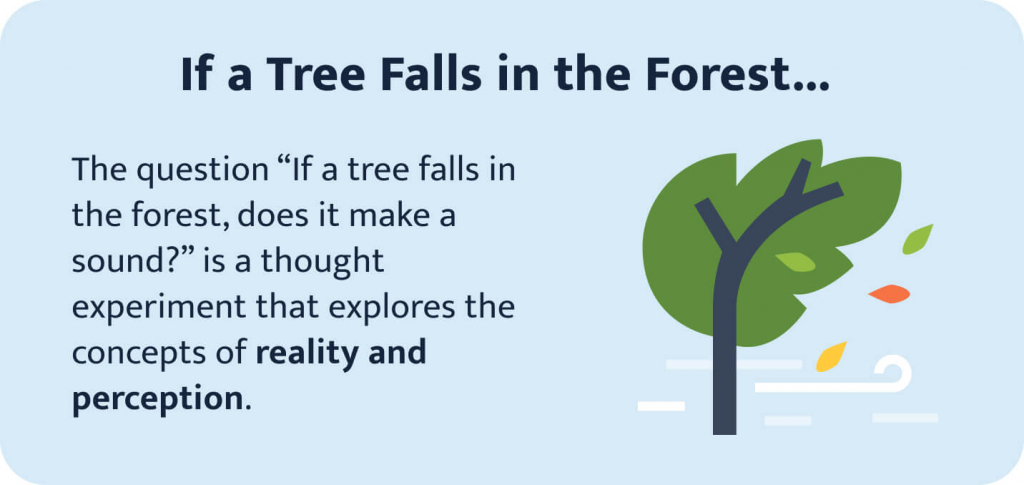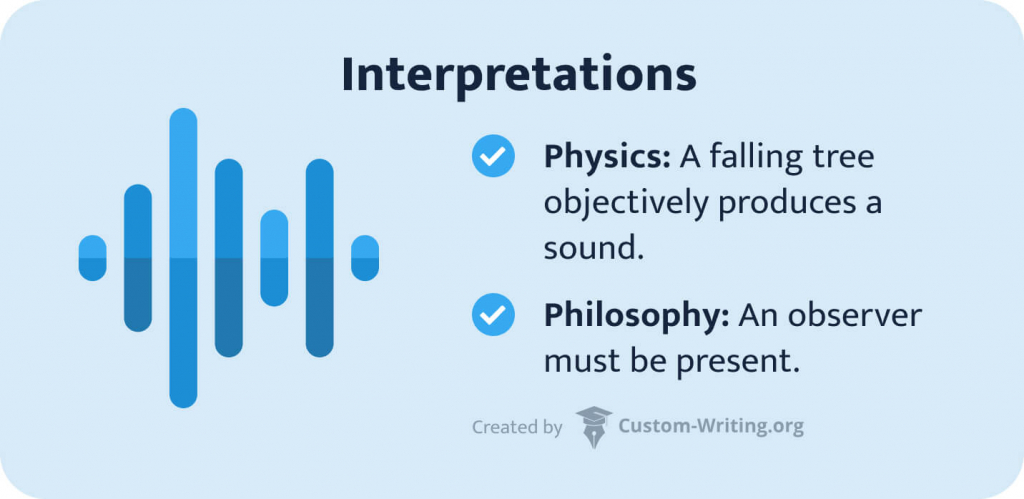“If a tree falls in the forest…” — the meaning of this phrase is one of the most debated issues in philosophy. The question “If a tree falls in the forest and no one is around to hear it, does it make a sound?” doesn’t have a single author. Instead, it reflects an evolving philosophical idea connected to the phenomena of observation and perception. While the question is rooted in 17th- and 18th-century philosophy, its earliest known use in written form appears in The Unseen World and Other Essays (1910) by William Fosdick.

The tree-falling thought experiment can illustrate an infallible conjecture — a paradox in which something unobserved is still assumed to exist or occur. While the obvious answer might be “of course the falling tree makes a sound,” how can that be verified if no one is there to hear it?
Many have attempted to answer the “if a tree falls in the forest” question, including renowned philosophers George Berkeley and John Locke. Berkeley argued that phenomena only exist when they are perceived, while Locke believed that reality exists independently of the mind. So, Berkeley’s answer to this question would be “no”, and Locke’s “yes”.
Need to explore various perspectives on the “if a tree falls in the forest” question for your essay? You are on the right page! The following article by Custom-Writing.org contains a discussion of this thought experiment, some handy writing tips, and an essay sample.
🌳 If a Tree Falls in the Forest, Does It Make a Sound: Meaning
So, what’s the meaning behind this simple question about a falling tree? Let’s unpack it!
From the scientific point of view, questions like this allow us to examine various natural phenomena through observation. In particular, the thought experiment known as “if a tree falls in the forest” explores the concepts of reality and perception. Essentially, it means “does something happen even if no one witnesses it?”
❓ If a Tree Falls in the Forest: Answers to Frequent Questions
What’s a Scientific Answer to “If a Tree Falls in the Forest”?
According to the principles of acoustics, sound is the result of air vibrations transmitted to the human brain through the sensory system. As the tree falls, airwaves appear (you can read more about the phenomenon of sound waves on Tech Target.) So, from the scientific viewpoint, a falling tree objectively produces a sound.
What’s the Philosophy of “If a Tree Falls in the Forest”?
John Locke attempted to discover what happens if nobody is in the forest when the tree is falling. Does it make a sound in that case? He concluded that any noise should be perceived by a human being. If nobody hears the falling tree, we cannot be 100% sure it produces any sound.
How “If a Tree Falls in the Forest” Relates to Quantum Physics?
The idea that someone needs to hear the sound of a falling tree is very reminiscent of quantum physics, according to which phenomena both happen and don’t happen unless there is an observer who perceives a finite result. Feel free to check out Oxford University Press’ article on quantum theory to learn more.
What Does Locke Say About a Tree Falling in the Forest?
John Locke gives the status of infallible conjecture to the question of whether a tree that falls in the forest makes a sound. Infallible conjecture means that the statement can be neither proved nor disproved. So, if nobody witnessed a falling tree, there is no proof that the sound occurred.
Which Philosopher Said “If a Tree Falls in the Forest”?
John Locke was the one who asked a question about a falling tree. This phrase is often mistakenly associated with Berkeley, who said the only things that actually exist are our minds and ideas. Berkeley’s philosophy also deals with perception and experiences.
What Kind of Question Is “If a Tree Falls in the Forest”?
This question is an example of a philosophical thought experiment without a simple “yes” or “no” answer. The solution depends on whether you believe phenomena can happen without anyone observing them. Thus, some people think the answer to whether a falling tree makes a sound is negative, others think it’s positive, and some think it’s both at the same time.

📋 John Locke “If a Tree Falls in the Forest” Essay Example
Need some inspiration for your essay on this topic? You’re in luck! We’ve prepared an essay sample for you. Check it out:
Example:
The question “If a tree falls in the forest and there’s no one around to hear it, does it make a sound?” is a thought experiment at the intersection of science and philosophy. Numerous attempts to solve this question led to different results. John Locke was among the most prominent philosophers who shed light on this issue. This essay will focus on Locke’s philosophy regarding the issue of “if a tree falls in the forest.”
First and foremost, it’s crucial to explore the scientific side of the question. The principles of acoustics explain that sound waves appear due to air vibrations. When a tree falls, sound waves occur so a person can hear a noise. Thus, from a scientific perspective, the falling tree does produce a sound.
However, life is not limited to science, and some phenomena are more complex than they seem. The concept of noise was created by living beings capable of perceiving it, but it does not mean that sound, as we understand it, objectively exists. Thus, from the empirical point of view, the answer to the question is more complex.
To find a solution, John Locke relied on the principles of epistemology—a branch of philosophy that deals with studying nature by experiencing it. If science proves that a falling tree makes a sound in any case, epistemology doubts this claim. To confirm the presence of sound waves, a human observer is needed. However, if a tree falls in a forest and no one witnesses it, there is no guarantee that the falling tree will produce noise.
John Locke’s solution to this issue involves the identification of previous occurrences. He claims that people gain knowledge from experiences and then relate it to present situations. So, having witnessed a falling tree or something similar once, a human learns about a sound that occurs. In the subsequent cases, this human perceives a falling tree and connects it with the concept of sound. The issue of the falling tree requires the hearing sense to determine if it indeed produces noise.
Overall, the question “if a tree falls in a forest” can be answered using science and empiricism. The scientific point of view claims that a falling tree produces sound in any case. From the empirical perspective, supported by John Locke, the existence of noise can only be proven if a human being experiences it.
✍️ “If a Tree Falls in the Forest” Essay: How to Write
Composing a philosophical paper on the thought experiment “if a tree falls in the forest” may be challenging. But with our help, your essay writing process will be a breeze!
Check out the following step-by-step guide:
Step #1: Study the literature.
Before you start, read multiple sources about this philosophical question. It will help you to get a broader perspective and understand the issue more clearly.
Step #2: Make an outline.
Structure your ideas logically. A detailed outline will make it easier for you to write the essay.
Step #3: Write an introduction.
Briefly describe the origin of the question and highlight its importance and relevance. Also, it’s a good idea to mention John Locke and his contribution to the study of reality vs. perception. Finish with a concise thesis statement that expresses your essay’s main idea.
Step #4: Write the main body.
Dedicate a separate body paragraph for each of your ideas to make your paper well-structured. Ensure that the essay’s key points are logically related to each other and presented coherently.
Step #5: Come up with a conclusion.
Restate your thesis statement and summarize the main points. Ensure that the conclusion provides a sense of closure.
Step #6: Polish your essay.
The final stage is proofreading and editing. Read your essay several times, paying attention to spelling, punctuation, grammar, and logical structure.
Philosophy Essay Dos & Don’ts
Want to take your philosophy essay to the next level? We know how to help you! Below, you’ll find beneficial tips.
To make your paper stellar, consider the following:
✔️ DO:
- Pay attention to the word choice. For example, transitions will make your essay more dynamic.
- Cite the sources and format the quotes appropriately.
- Use solid supportive details to strengthen your claims.
- Present counterarguments to acknowledge that there might be opposing views.
However, try to avoid the actions below during the writing process.
❌ DON’T:
- Write an overly long introduction. Instead, make it catchy and to the point.
- Overuse quotations.
- Be indecisive. Choose your position and stick to it.
- Be too critical about the philosopher you’re writing about.
- Be intolerant of other people’s opinions.
Thank you for reading this article! Have fun exploring the “If a tree falls in the forest” answer in your essay. Good luck!
Further reading:
- How to Stop Corruption Essay: Guide & Topics [+4 Samples]
- If I Could Change the World Essay: Examples & Writing Guide
- Why I Want to be a Pharmacist Essay: How to Write
- Why I Want to Be a Teacher Essay: Writing Guide
🔍 References
- A Brief Guide to Writing the Philosophy Paper: Harvard University
- Writing a Philosophy Essay: University of Toronto
- John Locke: Encyclopedia Britannica
- If a Tree Falls in a Forest, and There’s No One Around to Hear It, Does It Make a Sound?: National Science Teaching Association
- If a Tree Falls in the Forest…: Psychology Today






![Precis Example, Definition, & Writing Guide [2026]](https://custom-writing.org/blog/wp-content/uploads/2022/02/education-concept-student-studying-brainstorming-campus-concept-close-up-students-discussing-their-subject-books-textbooks-selective-focus-284x153.jpg)


![Critical Analysis Essay Example & Writing Guide [2026]](https://custom-writing.org/blog/wp-content/uploads/2021/10/business-men-sitting-lawyers-s-desk-people-signing-important-documents-284x153.jpg)

